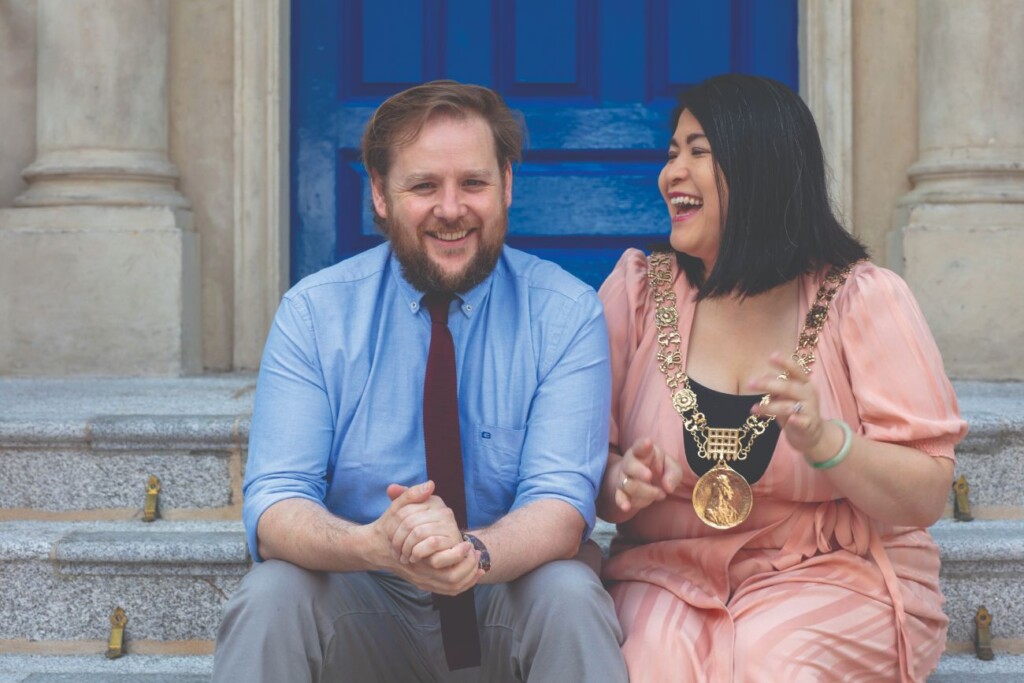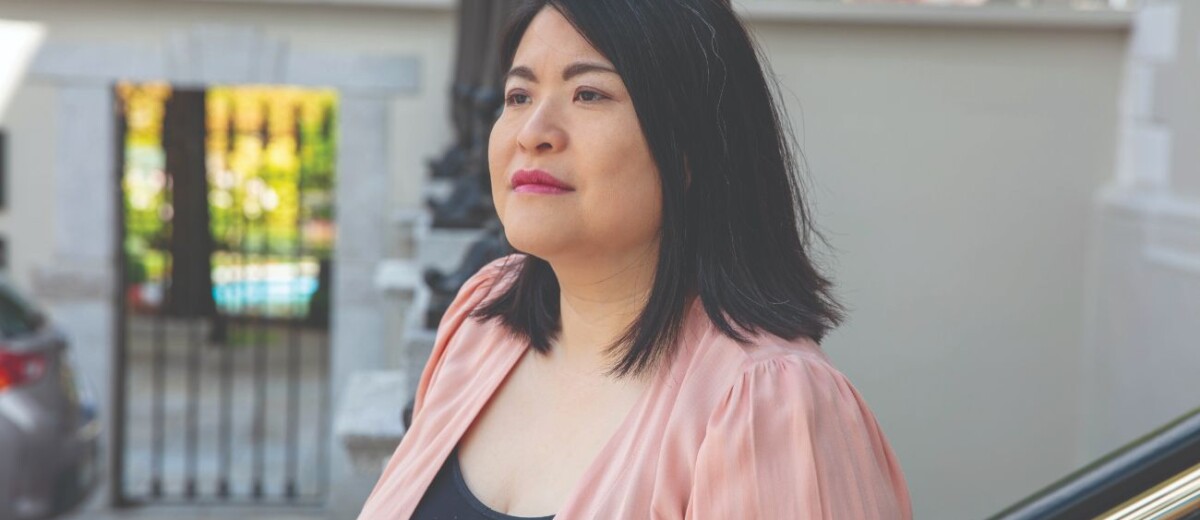“IT’S BEEN INTERESTING,” says Lord Mayor Hazel Chu, who sits opposite me across a broad and shining mahogany table in a large room in the Mansion House, when I ask how the months since her appointment have been. Chu, a UCD alumna and a Green Party county councillor since 2019, was elected Lord Mayor on June 29 by the members of Dublin City Council. “Surreal,” she adds with a laugh.
Chu is the ninth female Lord Mayor, and the first Lord Mayor of colour. She and her partner, UCD alumnus Patrick Costello, a Green Party TD for Dublin South Central, moved into the Mansion House with their daughter Alex, nearly three, just weeks ago. Costello, in line with existing protocols where the office holder is the Lord Mayor and his or her partner the Lady Mayoress, is formally the Lady Mayoress, “which highlights the anachronistic nature of some of the legislation”, Chu says, while Alex is, informally, “Mini Mayor”.
Did she ever envisage a career in politics, or being elected Lord Mayor of Dublin? “No, is the short answer! But cheesy as it sounds, I went into politics to represent people, to do some good. John Hume said: ‘I thought very simply in terms of helping people.’ I’m not saying I am any John Hume, but that should be the motivation, and for me it was.”
Chu’s parents came separately from Hong Kong in the 1970s, with almost no English. “As with many migrants, when they move to a new country, they tend to integrate with other migrants,” Chu says. “That’s how my parents met.” Her parents worked in restaurants and lived with “my aunt and uncle, their three kids, and my other uncle, all of us in the house” until Chu was six, when she, her parents and her younger brother moved to Celbridge in Co Kildare.
As she talks more about her upbringing, it becomes very clear where the instinct to advocate comes from. “Detractors will say to me ‘you went to private school, you’re very middle class now’,” she says, “but private school was an accident. My parents didn’t read English at all,” she continues, “any letter that came from my school, I translated for them. This one letter, I don’t know how I missed it, was informing parents that they needed to apply for the local secondary school by such a date. When it was time for me to go, the school was full. My parents then thought, ‘ok well, everyone tells us about these private schools, so let’s find one of those’. But Mum and Dad didn’t know where to look, so I ended up looking at all these schools and talking to teachers, at the age of eleven. It was a very bizarre process.”
And so, from an early age Chu was interpreting the world for her parents, advocating for them, and for herself. It seems like a natural progression into politics? “Yes. In any political role, you are advocating for someone, working for someone. This is what got me interested. To me, it was a natural career path.”
Chu went to school at Mount Sackville in Chapelizod (with a brief period in Rathdown in Glenageary), then on to study Politics and History at UCD. Later, she did a Barrister-at-Law degree at King’s Inns and worked in a variety of roles, including fundraising manager for St Michael’s House (providing services for those with an intellectual disability), a marketing consultant in New York for Bord Bia, an adviser to the Office of the Chief Scientific Adviser, and head of communications for Diageo Ireland.
“UCD was one of the first places where I felt safe,” she says. “I was bullied in school and through my teenage years. In UCD, I found my tribe. I found people who were not just of the same mindset, but who were protective if anything happened to me.”
This didn’t happen immediately – “like everyone, I felt apprehension going into first year. My first year was spent trying to find my feet. It wasn’t until second year that I found my people.” One of those people is her partner Patrick, who studied Psychology. “We are getting married next June – we were supposed to be married last weekend but Covid [put paid to that]. I was sending out invites, and looking at the list, 30 per cent are friends from UCD.”

She was auditor of the UCD Politics society, joined the History society, and she and Patrick were both active in the L&H. “When I was looking for Patrick, or anyone, I would go to the student bar. Inevitably, U2’s ‘With or Without You’ would be playing, someone would be at the bar trying to trade their Foster’s dollars for something, and my mates would be in the corner. Even now, that scene always plays in my head, like a movie.”
But, she says, “It wasn’t all sunshine and rainbows. And there are a lot of students I speak to these days who say it’s a struggle for them in college – financially, for housing, with their mental health – and that there needs to be more services.”
So how might UCD, for example, take a pro-active anti-racist stance? “The thing with colleges and universities,” Chu says, “is that their best activists are their students. Students participate, they fight the good cause. When it comes to anti-racism, if the students decide ‘we are going to talk about racism and discrimination’, we want the university to support and recognise that. Governing bodies need to listen to the students. There needs to be an ongoing conversation. Constantly talking, reflecting and working together. Whether fighting discrimination or supporting students, the communication needs to be stepped up.”
Chu entered the world of politics cautiously. “I did the background stuff first,” she says. “I ran Patrick’s campaign in 2014. At that stage, I wasn’t even a party member. But the more I started working for the Greens, the more I thought that if I really believe in this, I should make the leap.”
Even then, she didn’t leap without looking. “I looked at all the parties, except those on the far right, and did my homework on each of them. And after that, I decided ‘ok, it’s the Greens’. People often just see the ecological side, but for me, it was the social justice element that drew me. That has always been a big thing for me. You can’t grow up in Firhouse, nine people in a three-bedroom house, with immigrant parents, always struggling to put food on the table, and think you will eradicate those social justice issues out of your brain. The problems I grew up with are still problems now – housing, health, education, child poverty.”
Due diligence done, Chu joined the Greens in 2016. Even then, “I did not see myself as someone who would run. I was very interested in what happened in the background, and I ran for stuff internally: the executive council, then the chair of the executive. I founded the women’s group, then I was chairperson of the party. Finally, I thought, will I put my money where my mouth is, and represent the party externally as well? I took a long time to decide.”
What gave her pause for thought? “At the time I had a small child. I thought about my daughter and whether I had time. I talked to Patrick – we were going to be running two campaigns, mine and his; could we physically do this? Could we mentally do this? Family was a big question. Also, what do you hope to achieve? Are you going to be able to do good? and then there was a bit of me that thought ‘I’m not sure they’ll elect me, because I am different …’ Growing up in this country, I know it is a welcoming, collegial, warm place. As a people we are supportive, we see past colour and we are united. But there is a vocal minority who push a different agenda.”
Chu had experienced racism, but as isolated incidents rather than anything concerted. Enough, however, to know it was there. “At the back of my mind, I worried, will that minority surface? The people who bullied me when I was in school? The people who put my brother into A&E with broken bones when they beat him up when he was 15 because he was ‘yellow’? These aren’t everyday occurrences, but they happen. I did have that nagging thought – I’m about to put my face out there very publicly. It’s going to literally be on posters. Do I want to court that?” What persuaded her to go ahead? “Looking at my family and my daughter and thinking: ‘If I don’t do it, if others don’t do it, how are we supposed to set examples for her and others to do it?’”
Chu was elected with a record 33 per cent of the first preference vote. The overwhelming electoral support she received was, she says, “incredibly heart-warming. And then,” she adds, “a couple of months later, the job started, and the trolling came with it. It picked up– voicemails, phone calls, letters through the door.”And she has consistently called it out when it does, speaking the truth about racism in our society. “There is a need to be actively anti-racist,” she says.
“Racism is like any other big issue – you can no longer be an innocent bystander, and I don’t think you should be. Maybe people think, ‘I don’t want to get too involved in that,’ or ‘it would be weird for me to say it when I’m not the one suffering,’ but it’s not. Across the board, everyone is involved.”
Lady Mayoress Patrick Costello joins us now (“I think it’s hilarious,” he says of his title, then wonders if the Ceann Comhairle might call him “Lady Mayoress Deputy Costello”) and agrees: “Victims of racism,” he says, “partly because of their minority-excluded status, will find it harder to speak out. They need allies who find it safer to speak.”
As for the new Lord Mayor, she too will continue to speak out. “I’m in a very lucky position. The gravity of my role doesn’t escape me when I look around this room, full of portraits of Lord Mayors from hundreds of years ago. When I am attacked and then speak about it, I have that credibility: people will listen to me.”
As Lord Mayor – a role that is highly symbolic – she says: “‘As first citizen, I would very much like to see councillors united in our common purpose – I plan to build a mayoralty and initiatives to help us on this path. I would like us to unite to tackle the housing and homeless crisis, to build a liveable city for all our citizens, to fight discrimination and protect those who are vulnerable.”

